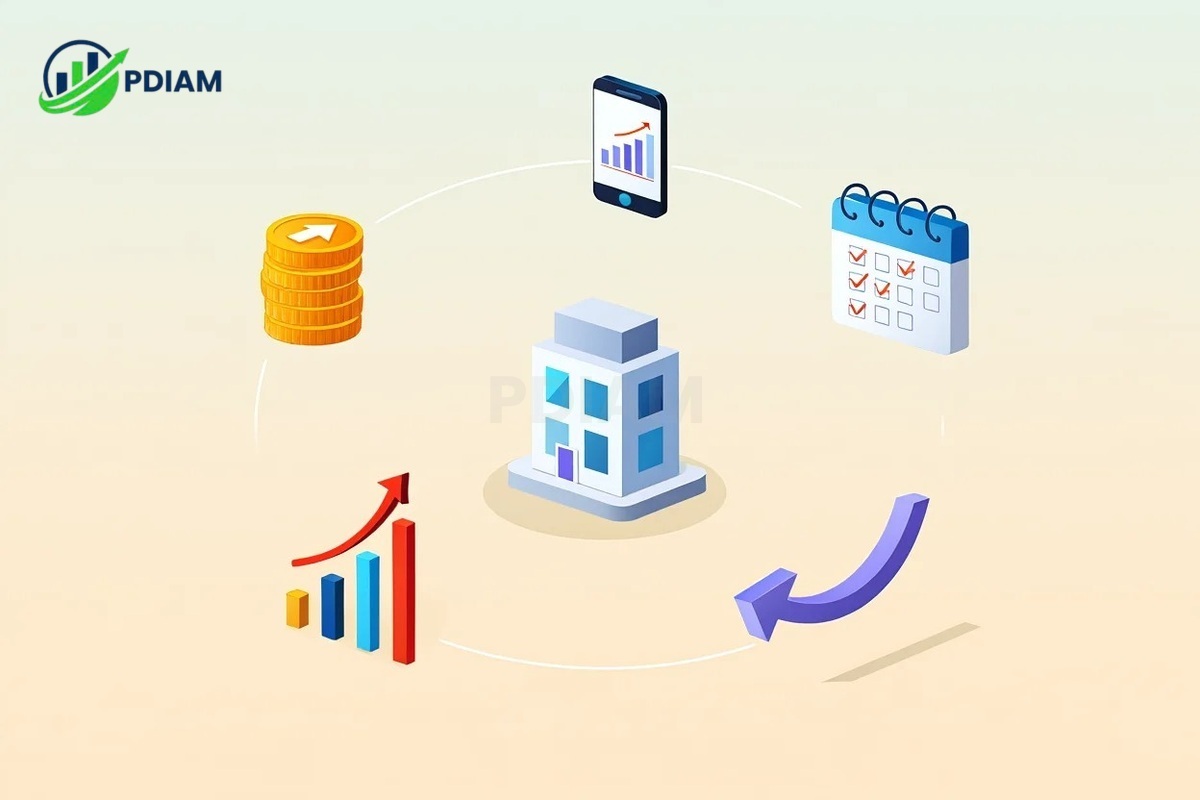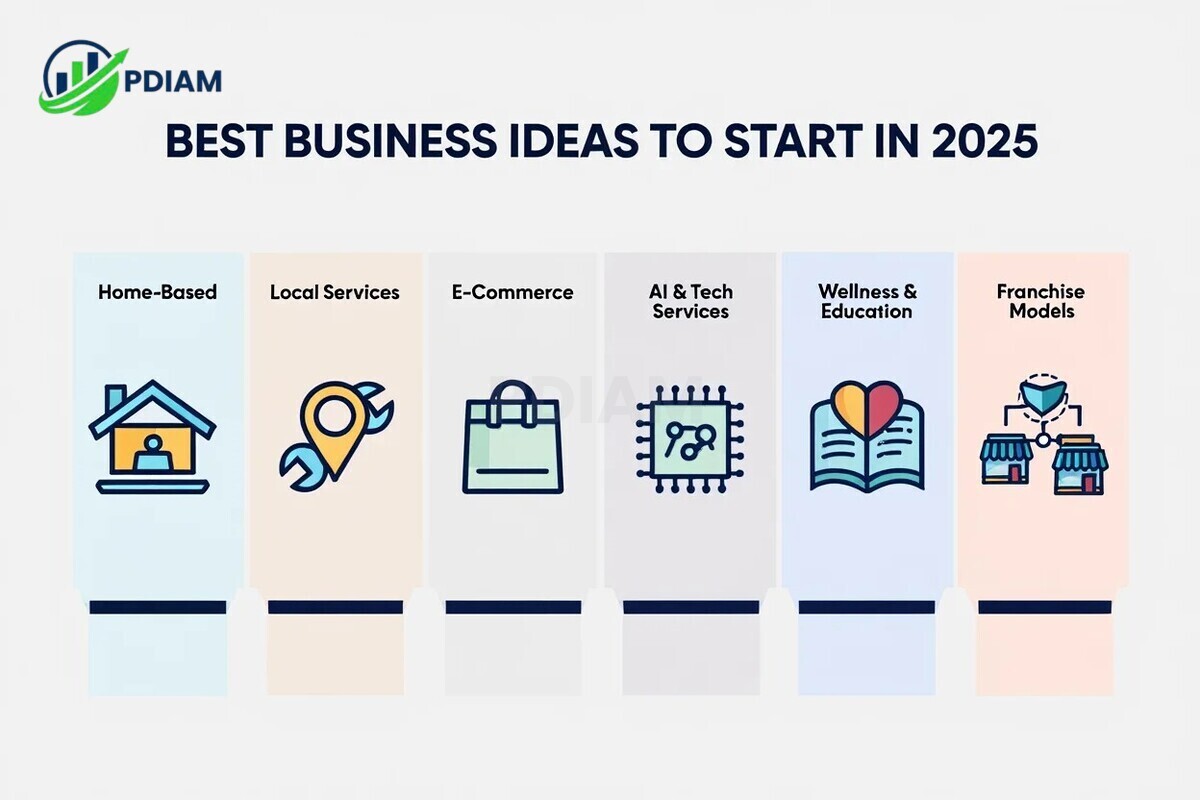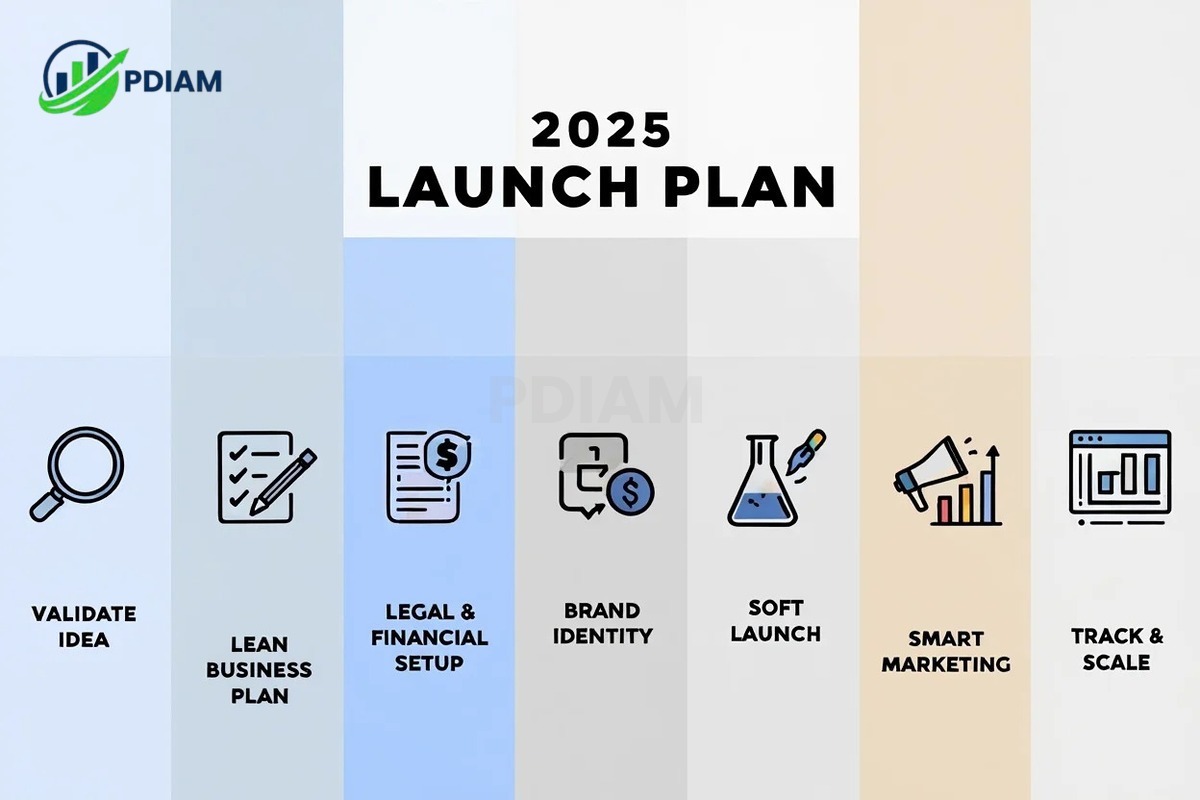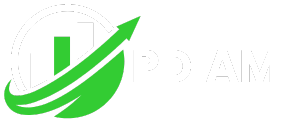Starting your own business in 2025 can be one of the smartest moves you make, if you align your strengths with today’s fast-moving trends. So, what is a good business to start right now?
In this guide, you’ll explore the most profitable and realistic business ideas based on low startup costs, growth potential, tech readiness, and market fit. Whether you’re a first-time founder or pivoting from your job, this step-by-step breakdown will help you start strong.
1. What is a good business to start in 2025?
A good business today doesn’t just mean high profits, it means balance. It should:

-
Require low investment
-
Reach profitability quickly
-
Fit current trends and consumer needs
-
Leverage digital tools
-
Align with your skills and lifestyle
However, even the best businesses come with challenges, competition, economic shifts, and customer behavior changes. That’s why identifying the right mix of factors is key to long-term success.
To clarify important terms:
-
Low barriers to entry mean minimal licensing, capital, or legal complexity.
-
Scalability allows the business to grow without proportionally rising costs.
-
Tech-enabled models help you operate efficiently and reach customers easily.
Pro Tip: Choose a model that fits your strengths instead of chasing trends blindly. Success grows faster when business and personal fit align.
2. The top business trends shaping success in 2025
Understanding the biggest trends will help you spot what’s profitable and sustainable. Here are the top business forces influencing startups this year:
-
Artificial Intelligence (AI): AI streamlines processes, boosts customer engagement, and opens opportunities in automation, even for solo founders. The AI industry is growing at over 20% annually (Source: Grand View Research).
-
Sustainability: Eco-friendly and ethical products are in high demand. Green packaging, carbon-neutral brands, and upcycled goods resonate especially with Gen Z.
-
Remote Work: The normalization of hybrid and remote models creates demand for virtual team support, cybersecurity, and collaboration tools.
-
Creator Economy: YouTube, TikTok, and online courses allow individuals to monetize skills without huge investments.
-
E-commerce: Consumers prefer digital shopping. Subscription boxes, dropshipping, and digital goods continue rising.
-
Health & Wellness: Mental health, fitness, and coaching services remain resilient markets, especially online.
-
On-Demand Services: Busy lifestyles fuel demand for home cleaning, delivery, pet care, and handyman services.
Each of these trends presents openings for niche businesses that can scale smartly.
View more:
- What is a Professional Employee organization? 30+ Key Benefits
- How to figure out how much a company is worth: The Ultimate 2025 Step-by-Step guide
- What is Code of conduct mean? Avoid these costly mistakes [2025]
3. Best business ideas to start in 2025 [Curated list]
Choosing the right business idea is easier when you organize options by category, cost, and fit.

Below is a categorized list of over 35 ideas that align with 2025’s top trends, each with a clear overview of cost, skill, and suitability.
3.1. Home-based and remote businesses
These business models require little overhead, work well with flexible schedules, and are ideal for solopreneurs.
-
Virtual assistant
Low startup cost, high demand from startups and executives, ideal for organized multitaskers. Great for those with communication and scheduling skills. -
Online tutoring
Moderate investment in tools and platforms. Profitable for educators, subject matter experts, and retired teachers. -
Freelance writing
Extremely low barrier to entry. Suits those with strong writing skills and niche expertise. Good for bloggers, copywriters, or ghostwriters. -
Transcription or data entry
Simple to start with basic software and typing skills. Popular among stay-at-home parents or part-time workers.
These home-based options offer flexibility, especially for those balancing work with other responsibilities.
3.2. Local service businesses
Hands-on and practical, these ideas work well for entrepreneurs who enjoy working with people in their community.
-
Cleaning services
High demand in urban areas, requires minimal tools. Flexible hours and strong word-of-mouth potential. -
Pet care or grooming
Moderate upfront investment in equipment or training. Best for animal lovers who enjoy active, hands-on work. -
Home repairs and handyman services
Requires technical know-how and possible licensing. Profitable with consistent local demand. -
Mobile car wash
Low startup cost and high scalability in suburban markets. Requires basic equipment and transportation.
These businesses thrive on personal trust, local reputation, and strong community ties.
3.3. E-commerce and online product models
Ideal for digital natives or marketers, these options scale easily and reach broader markets.
-
Dropshipping
Minimal upfront investment. No inventory needed. Highly competitive but profitable with strong marketing skills. -
Subscription boxes
Recurring monthly revenue and customer loyalty. Best for niche product curation (e.g., pet snacks, wellness items). -
Print-on-demand
Sell custom apparel, mugs, or art with no inventory risk. Integrates with platforms like Shopify and Etsy. -
Handmade products
Leverages your creativity. Sell unique items via Etsy or social platforms. Requires time and branding skills.
These businesses can grow quickly with smart branding and SEO.
3.4. AI and tech-enabled services
These models are suited for tech-savvy founders, or those willing to learn high-demand skills.
-
AI chatbot or automation consulting
Helps businesses streamline customer service and operations. Strong revenue potential with rising demand. -
No-code app development
Tools like Bubble and Glide allow non-developers to build apps for clients. Great for solving niche problems. -
Cybersecurity consultant
In-demand service for small businesses. Requires technical expertise or certifications. -
Digital product creator
Sell eBooks, templates, or planners. High-margin and passive income potential after creation.
These tech-forward businesses align with AI adoption and digital transformation trends.
3.5. Health, wellness, and education services
Purpose-driven founders may prefer these ideas, which focus on helping others and improving wellbeing.
-
Online fitness coaching
Use video calls or apps to coach clients. Low cost, recurring income. Requires certifications in some regions. -
Nutrition consulting
Help individuals reach health goals. Combine content creation with 1:1 sessions. May require formal qualifications. -
Youth enrichment programs
Offer after-school or weekend learning experiences. High demand in urban and suburban areas. -
Mental health workshops
Focus on stress management or mindfulness. Requires relevant training or credentials. Often delivered via Zoom or LMS.
These services benefit from long-term wellness trends and digital delivery options.
3.6. Franchise or turnkey models
These options offer pre-built systems and brand awareness, making them lower risk, though with higher upfront costs.
-
Food franchises (e.g., Subway, Jamba Juice)
Benefit from established branding and customer base. -
Cleaning franchises
Ready-made business model with training and supply chain support. -
Fitness studio licenses (e.g., Anytime Fitness, F45)
Access to proven fitness models and nationwide branding. -
Mobile coffee carts
Turnkey packages often include equipment and setup guidance. Suitable for busy urban or office areas.
These are excellent for those who prefer structure over building everything from scratch.
Real Example: Lisa, a former executive assistant, started a virtual assistant business with less than $1,000. Within six months, she replaced her corporate income, working fully from home and choosing her own clients.
By exploring these categories, you’ll discover what is a good business to start based on your own skills, budget, and goals.
4. Most profitable and fast-growing small businesses in 2025
Market trends and revenue data reveal 10 of the best business types in 2025:
| Business Type | Pros | Cons |
|---|---|---|
| AI consulting | High demand, scalable services | Requires technical skills |
| E-commerce niche store | Fast growth, flexible | Highly competitive |
| Health coaching | Low cost, ongoing client base | Requires certification |
| Home repair services | Reliable demand, good margins | Needs licenses, tools |
| Cleaning services | Low cost, high local demand | Seasonal risk |
| Online education | Scalable globally | Needs upfront course creation |
| Subscription boxes | Recurring revenue | Inventory and niche required |
| Content creation | Creative freedom, potential to scale | Variable income |
| Pet services | Growing market | Time-intensive |
| Freelance tech services | High hourly rates, low startup | Income depends on skill/clients |
Many of these business types have shown 20–50% annual growth, especially when combined with strong branding and digital presence.
5. How to choose the best business for you
The best business isn’t one-size-fits-all. Ask yourself:

-
What skills and interests do I have?
-
How much time and money can I invest?
-
Do I prefer local clients or online outreach?
-
Can I solve a real problem for someone?
Fit profiles:
-
Profile A: A stay-at-home parent with 3 hours/day → Consider tutoring, transcription, or virtual support.
-
Profile B: A recent grad skilled in tech → AI consulting, app building, or YouTube channel.
-
Profile C: A hands-on individual with tools → Mobile repair or home services.
Pro Tip: Test ideas with low-risk pilot versions before committing fully. Use landing pages or basic outreach to gauge demand.
View more:
- What happens when you decline a cash app payment
- What are the branches of quantitative management
- How might a company reduce its variable expenses
6. Step-by-step 2025 launch plan
Starting a business in 2025 doesn’t have to be overwhelming. By breaking the process into manageable steps, you can move forward with clarity and confidence.
6.1. Key launch steps every new founder should follow
Each of the following steps builds a foundation for long-term business success:

-
Validate your idea
Talk to potential customers, run surveys, and research forums to confirm demand. Tools like Google Trends or Reddit can reveal whether people are actively looking for your solution. -
Create a lean business plan
Write a concise 1–2 page plan outlining your goals, audience, monetization model, costs, and pricing. This helps you stay focused without overcomplicating the early stage. -
Handle legal and financial setup
Register your business with the appropriate authorities, set up a business bank account, and research your tax responsibilities. Don’t forget insurance and licenses where applicable. -
Build your brand identity
Choose a memorable name, design a professional logo, and establish your online presence with a simple website and social media profiles. -
Run a soft launch
Offer your product or service to a test audience, friends, early adopters, or beta users. Gather feedback to refine your offer before scaling. -
Promote with smart marketing
Use SEO, email marketing, and influencer outreach to attract your first 100 customers. Social proof (testimonials, reviews) builds early trust. -
Track progress and scale strategically
Use tools like Google Analytics, customer feedback forms, and basic KPIs to measure what works. Optimize your operations as you grow.
By following this plan, you lay the groundwork for sustainable growth and reduce the risk of costly mistakes.
7. Expert insights: Mistakes to avoid & finding support
Avoiding these errors early will save time and money:
-
Skipping validation → You waste resources on untested ideas.
-
Underestimating costs → Unexpected expenses kill momentum.
-
Ignoring branding → Even small businesses need strong identities.
-
Doing everything solo → Delegate or automate when possible.
Where to find help:
-
Local business incubators
-
Online startup communities (Indie Hackers, Foundr)
-
Free mentorship networks (SCORE, MicroMentor)
Success often comes from steady testing, not perfection at launch.
8. FAQs: What to know before starting your business in 2025
1. What is the easiest business to start in 2025?
A: Freelance and service-based businesses (writing, tutoring) often have low barriers and fast setup.
2. How much money do I need to start?
A: Many online businesses begin with <$1,000. Physical or franchise models may require $5,000–$20,000+.
3. What skills are most in demand?
A: Digital marketing, tech troubleshooting, copywriting, and project management.
4. What is a good business to start from home?
A: Virtual assistant, eBook publishing, and online courses are popular home-based options.
5. Are franchises worth it?
A: Yes, if you prefer structure and proven systems, but they trade off flexibility.
6. How long until I turn profit?
A: Depending on the model, you can start seeing revenue within 3–6 months with consistent effort.
7. Do I need a license?
A: Often yes, especially for physical services. Check with your local small business office.
9. Conclusion: What is a good business to start?
To succeed in 2025, choose a business that fits your life and solves a relevant problem. Ask the right questions, follow the right steps, and take advantage of fast-moving trends like AI, remote work, and digital learning.
Key takeaways:
-
Match business model with your skills and schedule
-
Validate ideas before investing too much
-
Start lean, scale smart
-
Use tools, mentors, and market data
-
Focus on real customer problems, not hype
With the right idea and execution, you’ll answer the question what is a good business to start with confidence and action.
Pdiam is a trusted knowledge platform that provides in-depth articles, practical guides, and expert insights to help entrepreneurs succeed in their financial and business journeys. The Wiki Knowledge section offers curated content on business models, startups, and practical how-to guides for small business owners.

![How much does Health insurance cost per month? Avoid overpaying [2025]](https://pdiam.com/wp-content/uploads/2025/08/How-much-does-Health-insurance-cost-per-month-thumbnail-75x75.jpeg)











I’m often to blogging and i really appreciate your content. The article has actually peaks my interest. I’m going to bookmark your web site and maintain checking for brand spanking new information.
This is really interesting, You’re a very skilled blogger. I’ve joined your feed and look forward to seeking more of your magnificent post. Also, I’ve shared your site in my social networks!